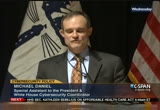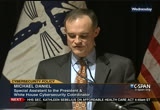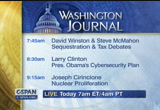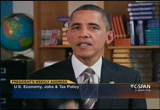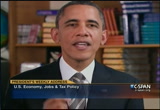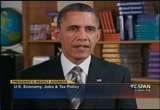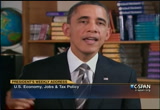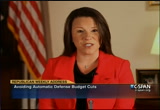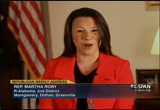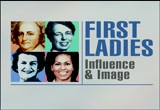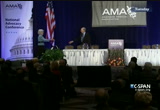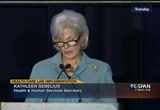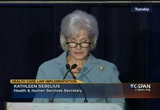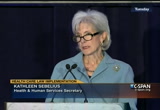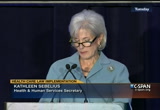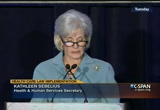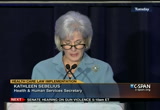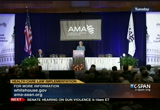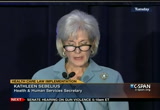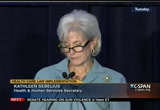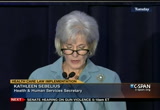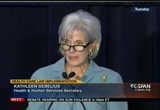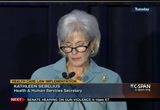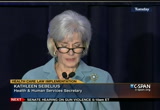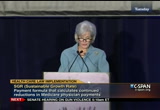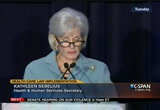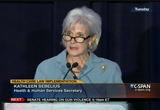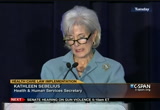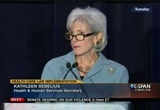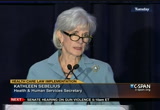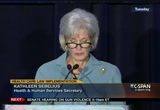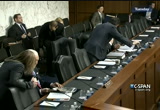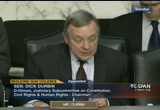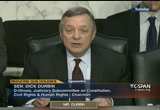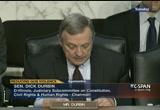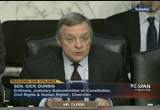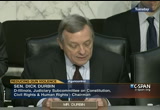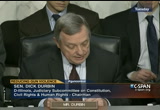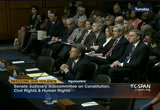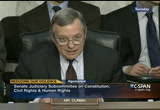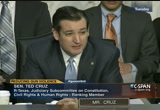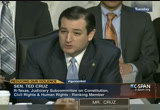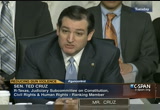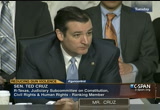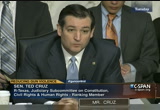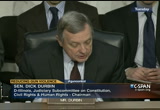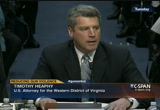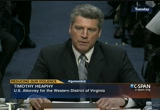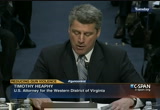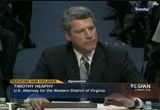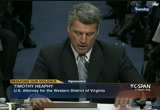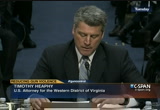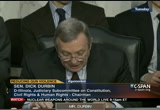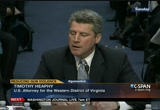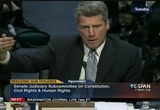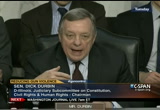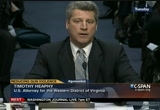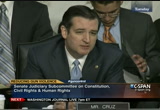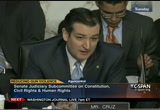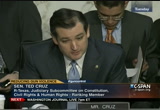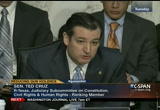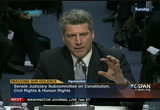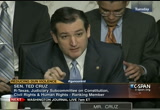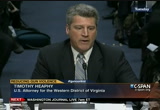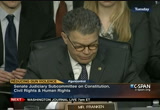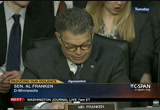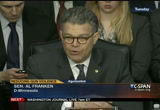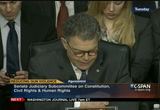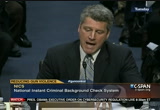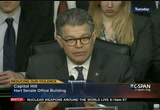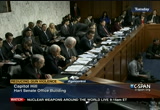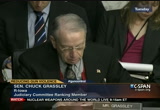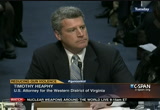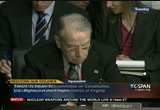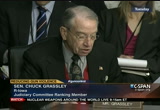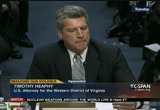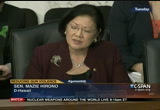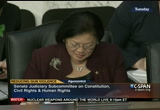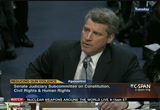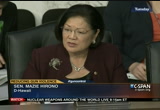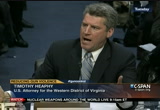tv News Politics and Public Affairs CSPAN February 17, 2013 4:35am-6:00am EST
5:00 am
>> growing administrative burden on doctors. that is why we said that doctors will now be able to report one set of results for dq .r's -- pr's we announced last week a bill estimated to save health care providers in rural areas nearly $700 million a year. finally, we remain committed to an sgr fix that would take america's doctors out of a permanent state of limbo.
5:01 am
[laughter]-- [applause] long overdue. as you know, the recent fiscal cliff deal signed by the president extends the sgr through the end of the year. he and i have both said since the beginning of the term, temporary extensions are not good enough. we need to bring an end to the constant uncertainty for doctors and their patients. ultimately, only congress can pass a permanent sgr fix. this administration continues to be committed to doing what we can to make that happen. every deer that the president has been in office, his budget has included a long-term sgr fix. that is why i will continue to work with you in congress during this critical year for budget conversations that include the sgr fix. we also continue to believe that congress can and should take action to avoid the sequestration cuts that are
5:02 am
scheduled to take effect in just a few weeks. the way those impact our department art that medicaid and chip programs are not affected by sequester cuts. they are held harmless. other essential programs across the department will be cut. everything from medical research to personnel and health clinics. medicare cuts up to two percent are scheduled to take place beginning on april 1. that would cut provider rates across the country. that is why the president continues to call on congress to prevent these indiscriminate cuts that would harm families, patients, doctors and it certainly would do great harm to our economy. it is important to realize that preventing these devastating cuts is just a first step areas unless we come up with a
5:03 am
credible plan to reducing health care spending going forward, we will ultimately end up in the same place with other costs, equally blunt, and other approaches that do not make any sense. that is why more efforts to accelerate the transformation of care are needed. i know that the ama has put forward a plan to do just that. it is encouraging to see recommendations for reducing unnecessary care, advanced by specialty societies in choosing wisely. physicians need to continue to play a major leadership role. your leadership also goes, not only to the health transformation part of the new law, but the second part of the law. that is expanding access to affordable coverage so more individuals can access care from the outset. this is a goal that the ama and america's doctors have supported for decades. you, better than anyone,
5:04 am
understand the consequences of going without health insurance. you see it in patients who do not fill the prescriptions you wrote, because they cannot afford it. you see it in the woman who shows up in the emergency room, consequences from a cancer that could have been and should have been caught early. you see it in families saddled with medical bills, they will spend their entire life trying to pay off. you see it in a burden that many of you take on, day in and day out, to provide care to the uninsured. the uninsured americans in this country have never been invisible to america's doctors. that is why you help in the fight that will finally bring america into the ranks of nations that make coverage affordable to all their citizens. because of your efforts, beginning on october 1 of this year, millions of uninsured americans across the country
5:05 am
will finally qualify for health plans that fit their budget. either through a new state marketplace, or an expanded state medicaid program. about half of the states have already said they will expand medicaid. many others are still deliberating. you can help make sure those debates are informed by fact. about what expanded coverage means for eagles health. about what it could mean to the local economy. and what the bottom line is for healthcare providers. no one has better credibility speaking about what is best for patients and doctors. make sure your voices are heard. you can also help educate people about new insurance options that are coming. as you know all too well from personal experience, dealing with health insurers is not exactly a favorite thing to do. for many americans, health insurance is confusing,
5:06 am
frustrating, something people want to avoid thinking about until they have to. again, you and a lot of people around you and your teams can be messengers to help educate your parents, family members, friends, neighbors about new coverage options that are beginning this october. a great place to start is our website, it has some clear information about the law, about who is eligible for coverage, and how people will be able to get started. as i mentioned earlier, i hope you will continue to lend your voices to the important debate about how we can come together as a country. -- to prevent tragedies like the one we saw in newtown. we know there is no single solution to the problem of gun violence. we all can agree, as the president called it recently, that physicians should be able to talk to their patients about
5:07 am
guns and health safety. we can also agree that we need to talk of a society about mental wellness. about what help may be available. as i said earlier, we will launch a national dialogue about communities and their work to promote better emotional health and creating environments for young people and their families where they feel comfortable asking for help. i am counting on america's doctors to help lead his conversations. the care you provide for your patience will always be your first job. today, there are many other ways for doctors to make a difference in peoples lives lives. starting with contributing to the transformation of our health care system. we have made great progress in the last few years. i look forward to working on that progress and creating a health system that patients vomit doctors, and this country
5:08 am
deserve. thank you all for what you do every day. [applause]>> today, rhode island senator sheldon whitehouse, author and former white house advisor, and representatives from the sierra club will be among the speakers at the forward on climate rally. coverage beginning at noon eastern here on c-span. >> i think the women themselves in many cases, were interested in politics but had no vehicle to express that in their own lives. they were attracted to men who were going to become politically active or were already politically after if -- active. >> each of them i find intriguing, probably half of them, precisely because they are so obscure. half of these women would probably be totally
5:09 am
unrecognizable to most men and women on the street. >> this presidents' day, c-span premieres its new series "first ladies, influence and image." with historians, chief of staff, social secretaries, and curators exploring the lives of the women who served as first lady from martha washington to michelle obama. in a first of its kind project for television. season one begins monday night at nine o'clock eastern pacific on c-span and c-span.org. >> senate judiciary subcommittee chairman dick durbin of the commission on reducing gun violence. witness included victims of gun violence and constitutional law attorneys. congress is considering several proposals to curb on violence such as banning assault weapons and curbing cartridges.
5:10 am
this is an hour and 20 minutes. >> this hearing will come to order. today's hearing is entitled, proposals to reduce gun violence. protecting our communities while respecting the second amendment. this is the first hearing of this constitutional subcommittee. i want to welcome my ranking republican member, senator ted cruz of texas. thank you for joining us at this committee hearing, as well as my other colleagues. i also want to thank senator pat leahy for giving us the opportunity to have this hearing today. we are pleased to have such a large audience for the hearing. it demonstrates the importance of this issue.
5:11 am
at the outset, i want to note that the rules of the senate prevent outbursts or clapping or demonstrations of any kind during these hearings. there was so much interest in today's hearings that we had to expand opportunity for the audience in an adjoining room. the overflow room is 226 of the dirksen building. i will make opening remarks and give ranking member cruz the same opportunity and then welcome our first witness. we are here to discuss a critically important issue, maybe a very basic question. we venerate in this country are committed to the life, liberty, and the pursuit of happiness of those who live in america. we also guaranteed under our bill of rights the right to bear arms. can we make these two consistent? can we protect a person's right to own a firearm and still say to the rest of america we also need to protect your right to life, peace, freedom from violence from those same firearms? according to the centers for disease control, more than 11,000 americans -- 11,000 -- are murdered by guns each year.
5:12 am
that is more each year than the lives lost in the tragedy of 9/11 and the wars in iraq and afghanistan combined. each year. every year, more than 30 men, women, and children are killed in violent shootings. 200 are shot and survived. numbers don't capture the deeply personal impact of gun violence. there are too many families who face an empty seat at the dinner table, too many parents who walk past an empty bedroom, too many husbands and wives who have lost the love of their lives because of gunfire. it has become almost routine in this great nation.
5:13 am
in park in chicago, in a nightclub in st. louis, illinois, in a movie theater in aurora, colorado, a shopping center in tucson, arizona, a sikh temple in oak creek, wisconsin, and the college lecture halls in illinois and blacksburg, virginia, and a first grade classroom in newtown, massachusetts, americans all over the country are saying enough. we need to act. we need to better protect our families, our kids, our schools, our loved ones from the epidemic of violence. some say that we should just enforce the laws on the books, but that is not enough. there are so many gaps in these laws that we now they created the situation we face today. the senate will take up proposals to close those gaps and reduce gun violence. we will consider universal background checks for gun sales, tougher gun laws against illegal stock purchasing, stopping the flood of new military-style assault weapons on to our streets, limiting the capacity of new gun magazines to a level that allows for reasonable self- defense but reduces the scope of carnage that a mass shooter can cause.
5:14 am
all of these proposals are based on common sense. all of them have strong support among the american public. and all of them, i believe, are clearly consistent with the constitution, the second amendment, and the bill of rights. in the landmark supreme court decision in heller in 2008, the court determined that americans have the individual right to possess firearms for lawful purposes such as self-defense. but justice scalia, no liberal, writing for the court's conservative majority, made clear that the second amendment right is "not unlimited," and like other rights, it is subject to reasonable regulation. the heller decision makes pays not to cast any doubt on common sense gun laws. over and over, gun regulation is described as "permissible," supported by historical tradition and "presumptively lawful." when given the opportunity to retreat from those statements in the 2010 macdonald case, the court instead reinforced the same statements and described them as "assurances."
5:15 am
in hundreds of cases following heller, lower courts have upheld common-sense gun laws as consistent with the second amendment. there are some who continue to challenge the constitutionality of reasonable gun regulation, even though history, president, and the supreme court's statements in heller and mcdonald way heavily against them. they do so hoping that judicial activism will advance their no- compromise ideology when it comes to guns. i think we need to be careful. this is not some abstract legal debate. guns have forever changed the lives of so many people. let me mention just a few of them. hadiya pendleton, and understood in an inspiration to our
5:16 am
friends, all walking angel her cousin called her. she was taken from us two weeks ago. her family is here today. a student at northern illinois university, with a warm heart and bright future, murdered in her classroom by a man with a history of mental illness. her mother is here today. blair holt, killed while shielding his friends from a gang members spraying fire on a city bus. his friend is here today. marcus norris, hit in the face by a bullet that came through the wall of his house. thank god he survived. we are glad to have him here today.
5:17 am
a true american hero who dedicated his life to serving his country and his community, killed by gang members with a straw purchase gun. i attended his funeral service. the officer's family is here, and his sister will testify today. there are many more in this room today whose lives and families have been changed by gun violence. i would like to ask the friends and family of the victims of gun violence to please stand. look about his room. understand that the debate we have before us has affected so many lives.
5:18 am
thank you all for being here today. as we conduct this debate and honor your loved ones who are no longer with us, we know that we have to act. thank you for joining us at this hearing. senator cruz. >> thank you, mr. chairman. let me say it is a particular honor to serve as ranking member on this committee with you and a particularly high honor to serve on the committee with two former ranking members and chairman of this committee, senator cornyn and senator hatch, as well as the ranking member of the entire committee, senator grassley. all of us were rightly horrified by the tragedy in newtown, connecticut. to see young children senselessly murdered takes your breath away. let me say to each of you who has come here today that are the victims of crimes of violence, my heart goes out to you. thank you for coming, thank you for standing for your lost loved ones. i will tell you that i have spent personally much of my professional career working in law enforcement to, number one, prevent these horrible crimes of violence, and number two, to ensure that anyone who carries them out is subject to the very strict as punishments. i am hopeful that the fervor that we see on this judiciary committee hearing for standing up for victims of crimes of violence will carry over to issues other than gun-control.
5:19 am
i am hopeful that that same fervor will be present when judicial nominees are here, who have a record in history of allowing those who have committed violent crimes to walk free. i hope that same fervor on a bipartisan basis will be present when we're talking about how to ensure that the laws and resources are there to prevent violent criminals from carrying out their horrific crimes and to ensure that every one of them receives a fair and just punishment.
5:20 am
in my view, the divide on this issue is fairly straightforward. the focus of law enforcement should be on criminals, and we should be unstinting in protecting communities, many of the communities that each of you have suffered losses in, communities that sadly, law enforcement has been failing. and we should be working to fix that problem. at the same time, i think that we should continue to respect and protect the constitutional rights of law-abiding citizens. it is often lost in the debate over guns that the second amendment is part of our constitution. it is part of the bill of rights, it is indeed, as justice joseph story put it, the palladium of liberty, a fundamental protection of every american. in my view, stripping the constitutional rights of law- abiding citizens does nothing to prevent criminals from carrying out a violent crime.
5:21 am
and indeed, the overwhelming weight of the empirical evidence demonstrates that when the rights of law-abiding citizens to protect themselves, protect their homes, protect their families are taken away, a violent crime increases, citizens defenseless are vulnerable to violent criminals. for that reason, the two cities with the strictest gun control policies, washington, d.c. and chicago, both of which for years had effectively total ban on firearms ownership, so it could not be possible to have a stricter policy, both of the sadly suffered from some of the highest crime rates and highest murder rates, notwithstanding those laws. i would suggest in significant part because of those laws.
5:22 am
if you look in contrast to jurisdictions that have protected the constitutional right to bear arms, you have consistently seen a lower crime rates, lower murder rates, as individuals are able to protect their family. the supreme court decisions in heller and mcdonald were landmark decisions to they concern the question whether each of us is protected by the bill of rights, because the position of the cities of d.c. and chicago in that litigation was that no individual has any right whatsoever under the second amendment. the position of the litigants in those cases was quite extreme. today we are discussing what are the limits on that right, because the supreme court made absolutely clear that the second amendment is the constitutional right of every american, and i would point out that constitutional rights are designed to be protected not just when they are popular, but especially when passions seek to restrict those rights.
5:23 am
i look forward to this hearing underscoring the rights of the second amendment for every american. >> thank you, senator cruz. in keeping with the practice of the committee, the witness will please stand and raise the right hand to be sworn to do you affirm that the testimony you are about to give before the committee is the truth, poultry, and nothing but the trick, so help you god? let the record show that the witness answered in the affirmative. we are pleased to be joined by u.s. attorney timothy heaphy. there was a request by the republican side it to send a witness to our next hearing on the importance of enforcement of the gun law. timothy heaphy was appointed as u.s. attorney for the western district of virginia. he has worked in private practice and taught at the university of virginia school law.
5:24 am
mr. heaphy, thank you for joining us today. we will give you five minutes for an opening statement. your complete statement will be part of the record. and then we will ask you questions. >> thank you chairman durbin, ranking member cruz. i am pleased and honored to speak with you about the continuing work of the united states attorney community and the department of justice to address gun-related violence. this is a very personal issue to me. i've prosecuted hundreds of gun cases in my years as a federal prosecutor, including a yearlong
5:25 am
trial of a violent drug gang right here in washington, d.c. i currently serve as united states attorney and a district that has felt the pain of a mass shooting on the campus of virginia tech. i spoke to victims of these horrible crimes, and work with men and women to investigate them on the street. attorney general eric holder has stated that combating violent crime is a top priority of the department of justice. to that end, his task 93 state attorneys with the responsibility to localize strategies to apprehend, prosecute individuals, street gangs, and other criminal organizations that engage in gun-related violence. these local strategies require us to work smarter by gathering intelligence and focusing our enforcement efforts on the most dangerous and complicated threats in our communities.
5:26 am
we use that intelligence for vigorously prosecuting gun crime, relying on close coordination with agents from the bureau of alcohol, tobacco, firearms, and other state and local partners. we do more than arrest and prosecute. in communities where violence persists, we are forging partnerships for prevention organizations and supporting their important work. our strategy relies on a nationwide effort to keep guns out of the hands of prohibited persons. when licensed gun dealers run a background check on and every potential gun buyers, ensure that they're not selling firearms to felons, domestic abusers, drug users, people with mental health issues. but the background check system is only effective if it contains all relevant information from every source. the department of justice is working to create incentives and provide assistance to state governments, prime contribute is too deep background check system, to ensure that they put all relevant health records into the system.
5:27 am
even if we find a way to get every record in, our effort to prevent criminals from getting guns is hampered by current holds in the background check system. violent criminals often seek out sellers, whether at gun shows, the internet, with the yellow pages, who are not licensed dealers and not required to run the background check. extending the background check requirement to all commercial transactions, absent limited exceptions, is our best opportunity to keep firearms out of dangerous hands and keep our children and communities say. we worked closely with state prosecutors, local law enforcement officials, to determine if a particular gun case or gun offender should be charged in federal or state court. when cases come to us, we use
5:28 am
federal firearms statutes to prosecute prohibited persons who possess firearms, people who are prevented from obtaining a firearm due to an interception of the background check. we prosecute individuals engaged in the business of dealing firearms without a license or ignore law prohibiting gun sales to persons. we charge violent criminals with a range of other crimes, using statutes with often include lengthy mandatory sentences. additionally, we do what we can to prosecute cases involving trafficking and firearms, despite the enormous challenges that such cases present. there is no single federal statute for preventing a fire arms trafficking work stoppages in. this gap requires prosecutors to find other statutes, generally paperwork violations, that can be applied to the particular trafficking scheme. without more meaningful penalties for those who traffic in firearms, we will continue to find it difficult to dismantle
5:29 am
the criminal networks that exploit these statutory caps. i want to end by assuring this committee and the american people that the department's commitment to prosecuting is as strong as ever. the number of gun defendants charged by united states attorneys has declined slightly since 2005, but our number is significantly higher than in fiscal years 2000 to 2002. during the same period of time, the number of murders and other violent crimes has declined at a greater rate. our commitment to gun prosecutions has never wavered and has helped to lead to an overall decrease in violent crime.
5:30 am
thank you again for the opportunity to appear before you today. i look forward to answering your specific questions. >> let me say a word about chicago. it is a great city, but it is not an island. just outside chicago, in the suburbs, is a gun store responsible for 20% of the crime guns we confiscate in chicago. despite the laws in chicago, the fact that you can cross outside the city into the suburbs, go down state, neighboring states we found that 9% of the crime guns in chicago can be traced to the state of mississippi. we cannot deal with this in isolation, community by community. i want to deal with the issue of stop purchasing. start purchasing is a dangerous act that supplies criminals and other private purchasers with the guns. the primary statute used for charging penalizes a person who "knowingly makes a false statement material to a gun sale." the straw purchaser checks yes on the atf form that asks if you are the actual buyer of this fire arm. can you talk about the challenge prosecuting the cases that appear to be paperwork prosecutions?
5:31 am
>> yes. you are exactly right. when someone goes into a gun store and buys an arm on behalf of someone else, our hands are tied. we can prosecute that as a violation, but not what it is, and illegal stoppages of oregon. the statue that prosecutes a false statement on a firearm crime requires, a, evidence that the person knew he was making a false statement, and that is a difficult threshold for us to meet. prosecutions under that carries minimal sentencing guideline range. fully 1/3 of the charges resulted in a not guilty verdict because largely of this standard. another 37% resulted in a sentence of less than a year in prison. the statute itself, even if we have evidence of specific intent to conduct a straw purchase, does not give as much heat on
5:32 am
the back of end to get actionable intelligence. >> those who argue that we already have laws on the books, we just need to enforce them -- you are telling us that this is a weak law. it is the paperwork prosecution that is not taken as seriously as the actual death that might result from the gun purchase. >> we are constantly focused on gathering intelligence on more serious patterns of crime. gun trafficking is no exception of it is essential for us when we address someone who is a straw purchaser to get actual intelligence about where the purchase is going. the leverage we have to gain that intelligence comes from a significant penalty, and if the penalty essentially is a paperwork violation that is not intimidating, it is difficult for us to get work up the chain of the network. >> i have co-sponsored
5:33 am
legislation related to straw purchasers. senator kirk, my colleague in illinois, senator gillibrand, they have a law. do you think it would put a significant dent? >> yes, i do. it would give us the more severe penalties we needed to gain intelligence and build up the chain of network of individuals that conducted a straw purchases. >> we have heard in my state and other states that there is cooperation between state and federal prosecutors and allocating prosecutions, and many times, what could be an offense under either law is passed along to the local or state prosecutors. can you tell us how this affects the statistics on federal prosecution of gun laws? >> yes, senator. we have worked very closely with our state and local prosecutors. we do that in every district in
5:34 am
the country. in my district in charlottesville, virginia, when someone is arrested with a gun, there is a conversation between myself and the commonwealth attorney in that jurisdiction, and we talk about whether it makes sense for that offender to be charged federally or under state law. since the virginia tech shooting, there are increased penalties for being found in possession. it is a jurisdiction where the state can prosecute as we can. it has contributed to the slight decline in our overall number of gun defendants. >> the last point i will make is that on march 1, unless something else is it done, there will be a sequester and a cutback in the department of justice and the resources available for the prosecution of crime. about 1000 federal prosecutors
5:35 am
may be terminated or at least reduced and service. i think the impact is obvious. would you like to comment on that? >> we are trying our best to do all we can with the limited resources we have as those resources diminish, whether they are prosecutors or agents, our job is made more difficult. those sequester cuts would be difficult for us to absorb. >> thank you. senator cruz. >> mr. heaphy, i want to thank you for being here for your service on frontline law enforcement. you are focused on bringing criminal laws to bear. it is criminally input and i commend you for that, sir. >> thank you, senator. >> i would like to address two issues that came up in your testimony. the first is the efficacy of gun control laws, the second is
5:36 am
straw purchasers. let's start with the gun control laws and do they work. are you aware of any service empirical basis for the proposition that significantly restricting the rights of law- abiding citizens to keep and bear arms actually results in reducing violent crime? >> sir, violent crime is down substantially from where it was. i think that is in part to vigorous enforcement -- getting guns out of the hands of violent criminals. i don't know that we are ever going to stop violent crime. unfortunately, the business in which i work will always be necessary. what we are trying to do is increase the barriers to the commission of the violent crime, make it more difficult for the firearms -- >> let me point out a couple of things. number one, your statement that a violent crime is down is a statement about national trends, and you are right, and i agree that vigorous enforcement of criminal laws targeting violent criminals, that works. the question about stripping the rights of law-abiding citizens, however -- the only way to ascertain that is to engage in a comparative analysis of those
5:37 am
jurisdictions that have done so versus those jurisdictions that have not. for example, if you look at cities, of the top six cities with murder rates, detroit, sadly, in 2001, topped the list. baltimore was second. philadelphia, third. memphis, tennessee, the only one of these six without especially vigorous gun control laws, is fourth. chicago, illinois is 6. five of the six cities with the highest murder rates are among those cities with the strictest gun control. if you contrast that to cities that do not have strict gun control -- for example, my
5:38 am
hometown of houston, where there are nine murders per 100,000 people, that is less than 1/4 what detroit suffers under. you look at other cities in my home state of texas -- san antonio has 7 murders per 100,000 people. el paso has two murders per 100,000 people. that means detroit, the murder rate is 24 times higher than it is in el paso. i would also point out that the argument that you and chairman were discussing about cities such as chicago not being isolated islands, that there are places elsewhere in the country where people can legally purchase firearms -- none of those cities i discussed, houston, san antonio, el paso, are isolated islands. in the entire state you can purchase firearms.
5:39 am
what we see with the murder rates is that the murder rates are consistently lower. my question to you, not your subjective beliefs, but are you aware of any empirical data -- every one of us wants to reduce murder rates -- is there any basis to say that stripping the constitutional rights of law- abiding citizens would result in decreasing murder rates rather than increasing them, which, unfortunately, is the pattern i think we're seeing? >> senator cruz, let me start answering a question by thanking you and this committee for expanding our discussion of guns beyond mass shootings to urban violence. i've spent my career working on urban violence issues.
5:40 am
it is relevant to security. the fact that we're having this discussion about urban violence is much appreciated. my career working on this issue is showing me that there is no single factor driving this. this is a complicated issue of economic opportunity, health care. it is a complicated situation that breeds violence. tying permissive gun laws -- >> with respect, if i could stop you, i would point out that for the record, given twice the opportunity to answer if there is any empirical basis for the idea that strict gun-control reduces violence, twice you have been unable to answer that. with straw purchases, that may be a potential area of bipartisan cooperation. the chairman brought it up, and we would agree that if there are those with criminal intent transferring firearms to felons, there should be strict punishment for that. that may be a productive area of cooperation but i would point out that one of the largest straw purchasers we have seen in the last few years was, sadly, the united states of america in the fast and furious program,
5:41 am
sent thousands of firearms and deliberately allowed them to go into the hands of a violent drug cartels, which were used to murder hundreds of citizens, innocent citizens in mexico and at least one federal law enforcement officer. has the idea of walking guns, the idea of allowing criminals to have illegal guns, would you characterize that as a typical law enforcement practice? >> senator cruz, the fast and furious operation has been the subject of considerable inquiry. our inspector general issued a lengthy report that found that mistakes were made. it is a regrettable incident and
5:42 am
one from which we have learned. we will continue to incorporate the lessons learned from that report. i want to go back to your question about empirical evidence. prediction or prevention of violence is not an exact science. it is difficult to find any individual factor, be it gun ownership, poverty, educational opportunity, is tied directly to murder rates. i understand your question. it is a good question. and i appreciate the focus on these murder rates. but it is a bit of alchemy to come up with a single factor with respect to reducing violent crime. >> thank you. my time has expired. >> senator franken. >> thank you, mr. chairman, for holding this hearing. i want to thank some folks from minnesota who have been courageous in sharing their own stories of gun violence. mary johnson, angela, maya, police sgt mike duzan, i look forward to spending time with each of you tomorrow afternoon. i want to send my condolences to the people of oakdale,
5:43 am
minnesota, who experienced a horrific shooting last night. i spent some time traveling around minnesota in the aftermath of the shooting in sandy hook, and what i have learned is that we can honor minnesota's culture of responsible gun ownership while taking some reasonable steps to make our communities safer. gun-control is a central part of this. i support a ban on assault weapons and a limit on the size of magazines. i also believe that we need to improve and expand our background check system. billions of people because of our background check system have been denied guns.
5:44 am
it seems like there is a consensus being built around the idea that we should do background checks on all purchases of guns. part of improving the background check system involves updating mental health records in the national database and, of course, improving access to mental health is an important part of this entire discussion, too. what we cannot do this stigmatize mental illness. what we must do is improve our way our country of people who live with it. if we are going to talk about mental health, let's make it more than just a talking point. let's make it a true national priority. i would encourage all my colleagues to the mental health in schools act, would improve access to mental health services for our children so that we can catch this early.
5:45 am
i have talked to moms who have gotten professional help for the children that has not only changed their children's lives, it has changed their lives. i would just encourage my colleagues to look at this piece of legislation. mr. heaphy, i asked the president's gun violence task force to move forward in implementing the wellstone- domenici act, and i want to thank the administration for doing that. it is very important. the vast majority of people with mental illness are not violent, but there is a small percentage who can become violent if they are not diagnosed and do not get treatment.
5:46 am
i know that you put a special emphasis on community-based crime prevention projects since you have become a u.s. attorney. based on your experience, can you talk a bit about why it is so important for people to have access to mental health services in their communities? >> absolutely, senator. i can talk about this issue from the virginia tech experience. i served just up the road from blacksburg, and those wounds linger. they never really heal. one of the things we did in virginia on a bipartisan basis is change the way we captured mental health adjudications in the background check the system. virginia and now is really the gold standard for ensuring that respect for privacy, when folks are adjudicated by a judge or civilly committed with mental health issues, those records are put into the national criminal background check. the shooter at virginia tech had a mental health issues, but unfortunately the records were not.
5:47 am
we have to focus on this issue of, as you said, increasing access to treatment for those who need it. many states, unfortunately, have not followed virginia's lead and have not put those records in. that is one of the hold on the background check system. the department has supported grants to states to ensure full compliance. the records need to be comprehensive. but it goes all the way back to making sure that the treatment is available. that is a crucial component of public safety. >> thank you. my time has run out. just let me emphasize this for everyone listening. the vast majority of people with mental illness are no more violent than the general population. in fact, they are more often the victim of violence than the general population. but -- but there is a very, very
5:48 am
small minority of people with mental illness who can become more violent if they are not diagnosed and if they are not treated. we can catch those people earlier, we can identify them, and we can perhaps prevent some of the types of things we have seen lately. >> we have an early bird rule on this committee. the next senator is senator grassley. >> thank you, mr. heaphy. as a follow-up to the question on straw purchasers, all too often law-enforcement prevents enforcement on straw purchasers, decline for one reason or another. how many cases were presented to u.s. attorneys for suspected straw purchasers last year that were declined prosecution? >> senator, i don't know
5:49 am
exactly. i can get that information for you, but i don't have a specific number. >> i will appreciate your answer in writing. thank you. the title of today's hearing is "proposal to reduce gun violence protecting communities while respecting the second amendment." your testimony makes no mention of the second amendment, so, question -- has the department of justice taken any position on the constitutionality of the second and then on legislation pending before the senate that would ban so-called assault weapons? >> the department of justice and the administration understands
5:50 am
the impact of the heller decision, which found that americans have a fundamental second amendment right to self- defense but i believe that the heller decision admits reasonable restrictions on that right. without opining on a specific measure, one of the bills, whether it is or is not constitutional, i believe there are ways to regulate guns respectful of the second amendment. >> the department has not provided a position on this is of legislation. you know why they have not taken a position yet? >> the department supports an assault weapons ban and will ensure when it comes out that it is constitutional. >> the court provides for heightened scrutiny of law on the second amendment. >> the district of columbia statute at issue in heller impinged on that because it was an absolute prohibition of
5:51 am
firearms in the home. it is not go beyond that with the right to carry firearms anywhere. scalia in the heller opinion did admit it would be potential limitation on the right when time, place, manner, and restrictions are part of that overall right to self-defense. the sweet spot between defending the second amendment and doing what we can to minimize the public safety, the threat presented by these dangerous weapons. >> what basis is there to determine whether the ban is constitutional or not? >> i am not familiar enough with the opinion to give an opinion
5:52 am
on that. >> i would like to ask your question on fast and furious, but i'll want to also state that when he said policies have been changed, i have an e-mail to u.s. attorneys. as i said on the call, to avoid any potential confusion, i want to reiterate department policy. we should not design undercover operations which include guns crossing the border. the policy has not been changed about encouraging licensed gun dealers to sell guns. it is only that they are ordered not to do it if they know they are going to cross the border. it seems to me to be kind of just a conflict of policy for people in government to say that we ought to ban certain guns and at the same time you are having licensed gun dealers encouraged to sell guns to people illegally.
5:53 am
regarding fast and furious, as u.s. attorney, would you support atf encouraging federal firearms licensees to sell firearms to those they suspect of being straw purchasers? >> we learned a lot from fast and furious, and the emailed you are referring to encourages us to monitor all the undercover operations. there are cases when they and of criminal activity, and that is a dirty reality of our business, that we have to at times, working with our agents, work with people involved in criminal activity.
5:54 am
on a problem with fast and furious was insufficient scrutiny up the chain. we hope that since we have learned lessons from that, we will do a better job of protecting public safety with undercover operations. >> my time is up. >> thank you, senator grassley. senator hirono. >> i would like to thank the family and friends of victims of gun violence with us today. this is a critical issue for our country and our communities. to our testifier, you mentioned that the department supports a stand-alone straw purchasers statute. do you also support closing another loophole, purchasing of guns at gun shows? >> yes, senator hirono. currently it is too easy for prohibited persons -- felons, domestic abusers, those with health issues -- to evade the
5:55 am
background check requirement. they can walk down the street, go to a gun show, and with no background check walk out with a gun. that is a gaping hole in the system. we strongly support increasing to effectively a universal background check system. it should in it for limited exceptions ? intra-family transfers. but commercial transactions ought to be run through this system. >> we have had a discussion this morning regarding the correlation between tough gun- control laws and violent crimes at places such as washington, d.c. and chicago. i am all for using facts and evidence to inform our decisions. but the conclusions we draw from
5:56 am
this information can be very problematic and questionable. for example, hawaii has pretty strict gun control laws, and yet we would have, i would say it, very low, knock on wood, gun violence crimes in hawaii. i don't know of any empirical evidence showing the cause and effect between a weaker gun laws and fewer gun of violent crimes, unless you are aware of any such empirical cause and effect studies.
5:57 am
>> senator, i've worked on this issue for 20 years and, again, spent time with the victims, spend time with killers, people who have been involved with these acts of violence and are hoping for some leniency cooperating with us. i cannot say i know what causes gun violence. i wish we did. there is no more pressing problem to me and my colleagues in the department than in this. but unfortunately, it is a complicated, layered, textural problem that has so many different factors. it is very difficult to isolate one cause and tie it specifically to violent crime rates. >> had you had any experience with bullying in our schools leading to violence? we had a police officer, or police captain, i believe, who testified before the full committee saying that he considered bullying in our schools that could lead to violence, that could lead to the easy up attainment of guns, and that could lead to tragedy is, and he acknowledged that as a concern. have you had experience in this area? if so, what can we do to prevent bullying in our schools that could very well escalate? >> i appreciate that question, because it gives me an opportunity to talk about a more comprehensive anti violence approach.
5:58 am
we cannot just arrest people and think that we are going to have a safer community. we have to do what we can on the front end to prevent potentially violent criminals from getting guns and from perpetrating those awful acts. bullying is part of that, absolutely. we have to do what we can to prevent and provide resources for people who are believed. every u.s. attorney is trying to implement a very localized, please-based anti-violence strategy. in some communities, our prosecutors, particularly in the civil-rights division, have done a lot of work on anti-bullying programs and have people appreciate the unfortunate consequences of school bullying. yes, there are stories, very difficult stories, where bullying has prompted someone to violence. our approach to this problem has to be 360 degrees. it cannot simply be let's charge people who commit shootings
5:59 am
after the fact. it has to contemplate what we can do in advance to prevent those things from happening. >> thank you very much. >> thank you. senator graham. >> do you own a gun? >> i do not. >> do any of your friends own guns? >> yes. i live in state where guns are held in high esteem. but i have young children -- >> i understand. you're certainly right to make that decision. if senator cornyn and i wanted to buy a shotgun, could i do so without going for a background check? >> you are exchanging a gun? >> yes. would you agree with that exception? it would be a waste of money. >> i think there should be limited intrafamily transfers that should be exempted from the that should be exempted from the background check.
103 Views
IN COLLECTIONS
CSPAN Television Archive
Television Archive  Television Archive News Search Service
Television Archive News Search Service 
Uploaded by TV Archive on

 Live Music Archive
Live Music Archive Librivox Free Audio
Librivox Free Audio Metropolitan Museum
Metropolitan Museum Cleveland Museum of Art
Cleveland Museum of Art Internet Arcade
Internet Arcade Console Living Room
Console Living Room Books to Borrow
Books to Borrow Open Library
Open Library TV News
TV News Understanding 9/11
Understanding 9/11
